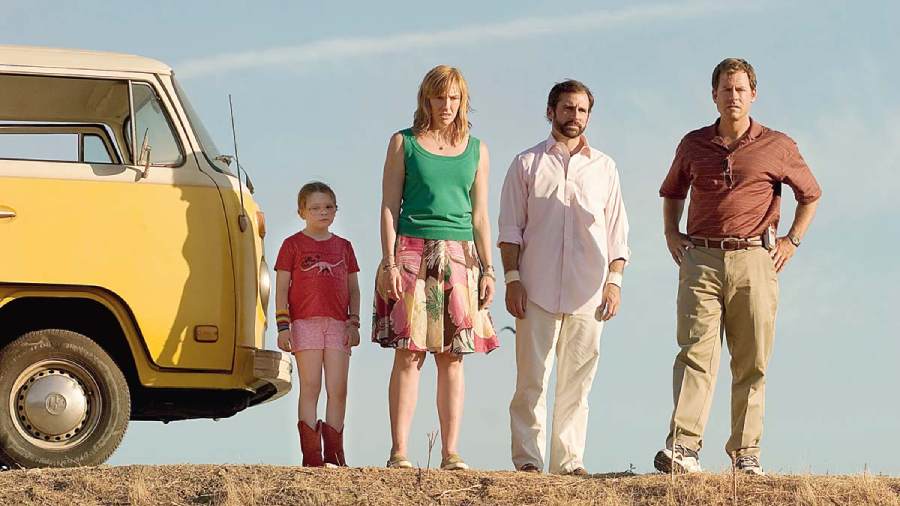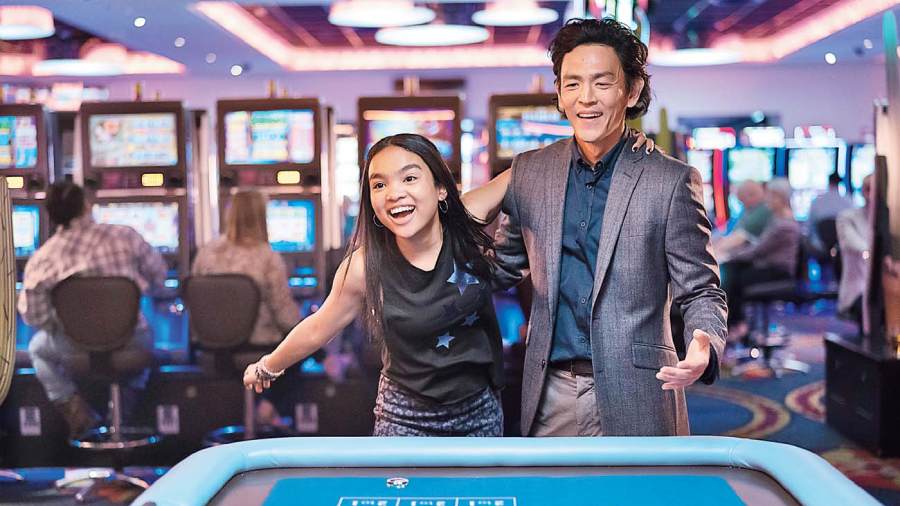Don’t Make Me Go tells the story of a father and daughter who embark on a life-changing road trip that both tests and tightens their bond, and throws up an unexpected twist. Starring John Cho as Max and Mia Isaac in the role of his daughter Wally, Don’t Make Me Go premiered at the Tribeca Film Festival in June and finds its way to Amazon Prime Video this Friday.
The film is directed by Hannah Marks, who at 29, has quite a few acting-directing credits to her name, having started out in showbiz as early as age six. Over a video call, The Telegraph chatted with Hannah on her new film and more.
You have directed films before, but Don’t Make Me Go is the first time you haven’t written the script. How was it like for you to tell someone else’s story?
I really enjoyed the experience. I related to the material a lot and I thought Vera (Herbert, writer) did such a good job. I did collaborate with the actors on set and improvise here and there, but overall it was definitely Vera’s story, and it was nice for me to do it from an outside perspective.
Can you talk about your experience of directing this film, both in terms of the challenges and the creative satisfaction?
The most challenging part was definitely the fact that we filmed in New Zealand. Don’t Make Me Go is a very American road trip movie and is about classic, authentic Americana, but because of the pandemic, we had to shoot the whole thing in Auckland, New Zealand. That presented a lot of challenges, in terms of the driving scenes, the architecture, accents and things like that. However, our local cast and crew were so incredible and so passionate about the story that they really put in all they had and I was very grateful to have them.
The most satisfying bit was shooting John Cho in the karaoke scene and seeing him singing Iggy Pop’s The Passenger. I had such a great time pre-recording it with him in the booth and then again shooting it live. We had a blast creating a new rendition of the song The Passenger.
This was originally the story of a Caucasian father and daughter. What made you eventually opt for John Cho, who has Korean roots and Mia Isaac, who is of Asian-African descent?
I am such a huge fan of John Cho and he really had all the aspects of the character that I was looking for in Max. He has a daughter in real life, he was in a band, he’s a terrific singer. He’s such a great actor, and I particularly loved him in a movie called Searching. I always felt he would be perfect for the role. And Mia came from a ton of auditions... she felt like his daughter (Wally) and it added to the story.
I like the fact that while this is Wally’s coming-of-age story, it is Max’s coming-of-age story too, and he is learning as much from his teenaged daughter as she is from him.
At a young age, we really don’t see our parents as real people. It’s only when we start to grow up is when we see them as three-dimensional flesh-and-blood people and this film, through these two characters, embodies that.

What are your favourites in the genre?
I like Little Miss Sunshine (above), and one of our producers Peter Saraf, was also a producer on that film. Even though it’s a different style, that film has a lot of themes similar to Don’t Make Me Go in terms of family, hitting the road to solve issues and going to new places in life, literally and metaphorically.
Have you been on a life-changing road trip or at least one which has been memorable?
Well, I am not a great driver (smiles), but I have done a lot of road trips to San Luis Obispo (in California) where my family lives. So I set off from Los Angeles, pack up the dogs, put on some music or listen to a podcast and it’s such a beautiful drive because it has the mountains, the greenery and also the water.
You have always been a storyteller who makes films that tell stories of your generation. Has that been by design?
Well, I like to tell stories that I know, tell stories from my own experience. As I get older, I hope my work will start to resonate with an older audience. Right now, I am drawn to characters that are close in age to myself.

Hannah Marks

As an actor, you are always waiting for the phone to ring. It can be really painful to feel that you are not in charge of your own destiny. I wanted to stay busy and active and I wanted to direct to stay sane! Having said that, I got into acting because of how much I loved the movies and directing always felt like a natural transitionAs an actor, you are always waiting for the phone to ring. It can be really painful to feel that you are not in charge of your own destiny. I wanted to stay busy and active and I wanted to direct to stay sane! Having said that, I got into acting because of how much I loved the movies and directing always felt like a natural transition
Death and illness is a recurring theme in your films. How do you explain that?
On a personal level, I have experienced quite a bit of illness and death in my family. Also, life-or-death stakes make for great movies because you are exploring such deep-rooted feelings, both from an acting and a directing perspective.
How does being an actor yourself influence, inform and contribute to you as a director?
On set, in particular, I try and show as much love, support and respect for the actors as possible because that is what I would want in return. As a director, I try and create a safe space for my actors so that they feel comfortable enough to take risks and to know that if something falls flat, it’s completely okay... they can always get up and try again.
Being an actor definitely influences the choices that I make in terms of pacing, rhythm, camera work and so on. As a director, I like to do a lot of close-ups and see what’s going on in the minds of my actors.
I am lucky that I started out at the time I did. I started out as a child actor... I was six, and I began working professionally at 11. My mom was also an actress and I am lucky to have a family that was so supportive of me pursuing my dreams from such a young age.
What made you want to take the leap from acting to directing?
Several reasons. As an actor, you are always waiting for the phone to ring (smiles). It can be really painful to feel that you are not in charge of your own destiny. I wanted to stay busy and active and I wanted to direct to stay sane! (Laughs)
Having said that, I got into acting because of how much I loved the movies and directing always felt like a natural transition.
The Passenger is a very important part of your narrative. If you had to name a song that defined your life now, what would it be?
Right now, I am really hooked to Oh No by Biig Piig... I have been listening to it on repeat. During filming, I was listening to The Passenger all the time... the original rendition, John’s rendition... I feel the song has an inherent rebellious spirit that really fits the movie.
You mentioned your dogs in this interview and almost Instagram post of yours is about your dogs. How much do your dogs define you as a person and as a creator?
Thank you so much for asking this! I don’t want anything more than to talk about my dogs all the time... much to the chagrin of many! (Laughs) They have completely changed my life. They make me feel like a mother. Taking care of them enables me to think outside of myself. It’s such a wonderful experience for me to care about something so much that isn’t me.
